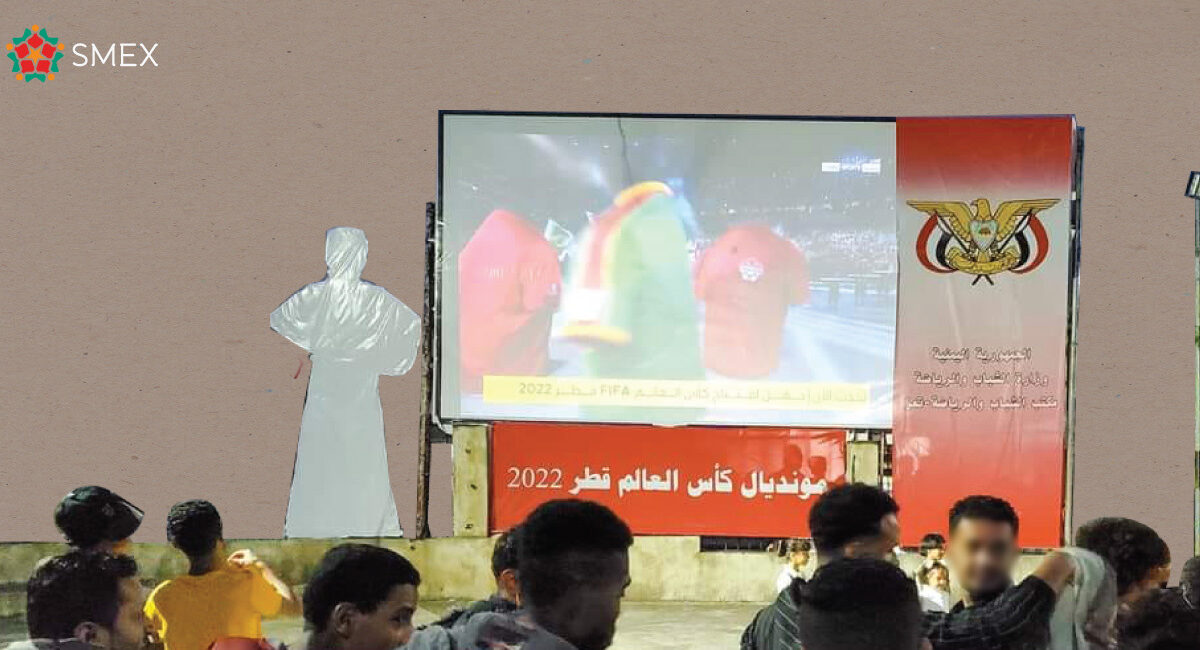During the 2022 FIFA World Cup, Ahmad Nasher, a 27-year-old Yemeni, worked tirelessly to re-route and receive signals of unencrypted sports channels broadcasting the World Cup matches.
“Employees’ wages are not enough to subscribe to the channels monopolizing World Cup coverage,” he told SMEX in an interview. “We did our best to help people watch the games at the lowest price possible.”
This was no easy feat, as Nasher tried to offer a streaming service that combines match coverage from foreign channels with local commentary. Speaking about this “illegal” practice, Nasher explained how “it was difficult for Yemenis to access ‘legal’ services, not least due to their outrageous prices.” People were left with no choice but to seek alternative solutions “to circumvent the monopoly of Arab channels that own the exclusive broadcasting rights.”
To access this service and watch the matches, Nasher said that viewers needed “a satellite dish 90 cm or 150 cm in diameter and an HD receiver for any of the free satellite services offering bundles of sports channels.”
However, Yemeni sports journalist Hamdi Al Abbasi told SMEX that those who could afford satellite dishes and receivers, or even electricity, “could only watch recaps or short videos of the games on social media.” The monopoly on broadcasting services is not the only issue facing Yemenis trying to watch the games. Excessive costs, power outages, Internet shutdowns, and slow speeds add additional blockages to accessing World Cup coverage, according to Al Abbasi.
When accessible, the internet is very slow
Yemenis have demonstrated remarkable local solidarity since the start of the World Cup in Qatar, as many individual and collective initiatives were launched to broadcast the matches in public squares in some governorates.
Nabil Ghaleb welcomed football fans at his youth club in the village of Al Marjamah in Ibb Governorate in central Yemen to watch the matches together. Shortly before the beginning of the World Cup, Ghaleb launched a local initiative to raise 245,000 Yemeni rials (approximately USD 250) to buy a receiver that streams the 2022 FIFA tournament from channels with exclusive broadcasting rights.
Ghaleb told SMEX that his initiative received widespread support, as he managed to purchase the receiver within a few days. He hosted more than 70 young people in his club, which normally only has capacity for 50 people.
However, their joy has been short-lived, according to Ghaleb, as his village suffers from frequent power outages. “The problem is not limited to the broadcasting monopolies, and it cannot be solved by simply buying a receiver,” he said with a heavy heart.
In the governorate of Taizz, many were unable to watch the matches due to their dire economic circumstances and the high subscription fees imposed by the official sports channels.
But Yemenis managed to find some alternative solutions, as network engineer Qais Al Sanawi told SMEX: “We came up with some solutions, including installing a local network in Jabal Sabir to broadcast some of the channels covering the matches. People who wished to watch the matches had to have a receiver and a reasonably priced recharge card.”
Sanawi also indicated that this service covers regions farther away, such as Al Houban, Al Qa’idah and Shar’ab. “In Taizz, we decode the channels, but they frequently change the encryption codes.”
Baynun Abdul Rahman (29) was passionately watching the matches with her mother, despite being in a country whose customs and traditions impose strict rules on women. Women in Yemen are denied the opportunity to practice sports or watch games in stadiums or in public squares.
As a result, Baynun told SMEX that she could not attend public spaces or sports clubs where the matches are broadcast “due to the customs and traditions imposed by society.” As a result, she was forced to stream the matches online from home, despite excruciatingly slow internet speeds in Yemen. “I used my home’s WiFi or my 4G bundle despite the poor connection. The matches are not fun to watch on the phone because the screen is too small and the internet keeps disconnecting.”
Telecom engineer at Yemen Mobile, Hamed Shaher, told SMEX that the constant outages in internet services were “due to the high pressure on the network during match times, as users across the country tried to watch them.”
For years, Yemen’s telecom sector has been fragmented between the Sanaa and Aden governments, not to mention the destruction of the infrastructure due to the war, preventing the maintenance or development of telecom networks, or even the provision of formal and good-quality services in most regions.
Cyber-traps during the World Cup
Hackers are known to exploit global events that spark widespread interest to hack users’ accounts. Cybersecurity expert Abdul Hafiz Al Hakimi told SMEX that the World Cup is “the perfect trap for hackers.” For example, they “flood users with links convincing them that they will win prizes for accurately predicting match scores.”
Users should always double check the links they use to stream World Cup matches online, as they may be phishing links. According to Hakimi, “they have received numerous complaints of this sort since the start of the World Cup.”
Phishing links are malicious links disguised as real URLs that can install malware when users click on them or urge users to enter a username and password or credit card information with the intent of stealing them, etc.
To avoid cyber traps, during the World Cup and beyond, SMEX recommends that users avoid suspicious links, verify the identity of the sender, avoid entering their information via such links and refrain from sending authentication codes to anyone, including family and friends. You can read this article for more tips on digital safety and this article to learn about the best ways to detect phishing links.



